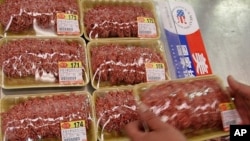A Taiwan Cabinet recommendation to import U.S. beef with a controversial feed additive would remove a barrier to trade relations between the wealthy island and the United States.
The U.S. is Taiwan’s second-biggest export market after China, but the two sides have not held high-level trade meetings since 2007. Washington cut the talks off in part because Taiwan has not joined Japan, South Korea and 100 other markets in accepting meat imports with a feed additive called ractopamine. Ractopamine is a drug that is used to make cattle and pigs "meatier".
The tentative plans Taiwan announced this week would set a maximum residue level for the additive in imported beef. The maximum level allowed would be 10 parts per billion.
The spokesman for the de-facto U.S. embassy in Taipei, Christopher Kavanagh, says the additive is safe and explains how Taiwan’s acceptance of it helps future trade ties.
“Taiwan is our 10th largest trade partner, but the beef issue has been a real stumbling block to making further progress," explained Kavanagh. "And so we hope looking forward after Taiwan, if they do set a maximum residue level for beef, that we can continue to move forward on our trade agenda.”
The top U.S. envoy to Taiwan told the island’s Central News Agency on Thursday that letting in beef is crucial to restarting the trade talks that Taiwan has been pushing the United States to restart.
Taiwan is one of the top overseas consumers of American beef, which accounts for about $128 million of total U.S. imports worth more than $26 billion.
China and the European Union also ban U.S. beef with the leanness additive, as some experts fear that it could lead to heart problems in humans.
Taiwanese have also been leery of U.S. beef in the past. Public opinion in 2010 pressured Taiwanese President Ma Ying-jeou to reverse part of a decision to import U.S. meats without the feed additive.
On Thursday, thousands of Taiwanese farmers protested the ractopamine decision in Taipei by hurling eggs and trash at a central-government building.
Ming Chuan University Associate International Affairs Professor Nathan Liu says Taiwanese will ultimately forget about the possible health risks.
“We all understand the U.S. citizens, Koreans and Japanese, they all eat U.S. beef. This is really not a big issue. The problem is that the communication between the government and general public is not really that smooth, so I expect these demonstrations, protests to be going on for the next week, but in the end everything will just go down,” Liu said.
Taiwan’s parliament must sign off on the Cabinet decision on a maximum ractopamine level, but most legislators belong to the ruling party and are expected to support the recommendation.
News
Controversial Beef Imports Could Improve Taiwan-US Ties




